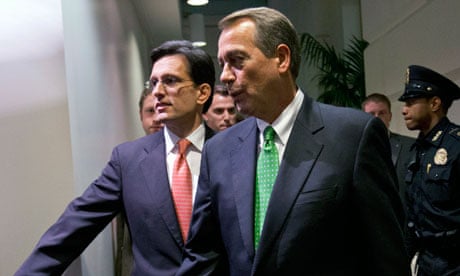Congress was in disarray over the fiscal cliff crisis on Tuesday after House Republicans, hostile to a bill passed overwhelmingly by the Senate only hours earlier, delayed a vote on the deal late into the night.
President Barack Obama had hailed the Senate vote and called on the House of Representatives to act "without delay".
House Republicans spent the day expressing opposition to the bill, which would raise taxes on the wealthiest but fails to include cuts in federal spending.
But by Tuesday night, it was clear they did not have the will to prolong the crisis any further and the House was preparing for a straight vote on the Senate bill. If the bill passes, legislation would be place before the markets open on Wednesday.
An attempt by some Republicans to move an amendment to the bill, which would add $300bn of spending cuts, appeared to have failed. If the bill was amended, it would almost certainly have fallen, as the Democrat-led Senate made it clear it would not accept any amendments.
A Democratic Congressman, Steve Cohen, in a speech from the floor of the House, expressed the risk if there is no agreement before the markets open. "My district cannot afford to wait a few days and have the stock market go down 300 points tomorrow if we don't get together and do something," Cohen said.
Hopes that the crisis had been averted rose when the Senate voted 88-9 in favour of the bill in the early hours of New Year's Day.
The Senate bill was intended to bring an end to the fiscal cliff crisis that confronts all American taxpayers with tax rises from 1 January. As well as the tax rises, deep cuts kick in to federal programmes from defence to welfare.
Without legislation, the tax rises and spending cuts stand. The White House has warned this could send the country's fragile recovery into reverse.
House Republicans, in particular hardline conservatives backed by the Tea Party movement, were taking a gamble in opposing the Senate: if the bill failed, they were in danger of being blamed by voters for the resulting tax rises.
Even senior Republicans in the House, in particular the Houe majority leader Eric Cantor, expressed dissatisfaction with the Senate bill, though he stopped short of pledging to vote against it.
The bill passed by the Senate, with 89 senators in favour and eight against, is a messy, short-term deal that raises taxes on the wealthiest but postpones for two months any consideration of spending cuts. The vote came at 2am on Tuesday, too late to prevent the country breaching the midnight fiscal cliff deadline.
The bill confines tax rises to individuals earning $400,000 or more a year and households earning $450,000 or more. It postpones spending cuts for two months, to allow further negotiations. Estate tax also rises, to 40% from 35%, but inheritances below $5m are exempted from the increase. Benefits for the unemployed are extended for another year.
The House presents a much bigger hurdle than the Senate, not only because the Republicans have a majority but because of the presence of a bloc of Tea Party-backed Republicans. The Republicans have 241 members to the Democrats' 191.
Boehner's instinct is towards compromise but he has had trouble keeping the Tea Party bloc under control. Theoretically, he has enough votes to push a bill through, but he is coming up for re-election as speaker and will not want to alienate conservative Republicans. Complicating the situation further, his main rival is Cantor.
The Senate deal was thrashed out in the past few days between vice-president Joe Biden and the Republican leader in the Senate, Mitch McConnell. It partly fulfils one of Obama's election campaign promises: to raise taxes on the wealthiest. But Obama was forced to compromise: he wanted higher taxes to kick in at $250,000 a year.
Democrats too are unhappy with the bill, regarding Obama as having given too much ground and seeing the $400,000 threshold as too high.
The White House dispatched Biden to Congress to persuade liberal Democrats in the House to back the bill. Democrats in the House emerged from the briefing with Biden pledging support, and urging Republican colleagues to accept the bill unamended.
Nancy Pelosi, the Democratic minority House leader, said the legislation sent from the Senate represented a "historic" bipartisan compromise. She also put added pressure on Boehner to allow the measures to go to a vote in the House, noting that he had previously suggested any bill from the Senate would be put in front of Representatives.
"That is what he said, that is what we expect. That is what the American people deserve," Pelosi said.
Hardening the resolve of House Democrats, the congressional budget office on Tuesday said the tax cuts and other measures in the Senate-passed bill would add nearly $4tn to federal deficits over a decade.
